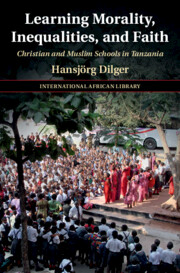Book contents
- Learning Morality, Inequalities, and Faith
- The International African Library
- Learning Morality, Inequalities, and Faith
- Copyright page
- Contents
- Figures
- Acknowledgements
- Note on Language Use
- 1 Introduction
- Part I (Post)Colonial Politics of Religious Difference and Education
- 2 Entangled Histories of Religious Pluralism and Schooling
- 3 Staging and Governing Religious Difference in the Haven of Peace
- Part II Moral Becoming and Educational Inequalities in Dar es Salaam
- References
- Index
- Titles in the Series
3 - Staging and Governing Religious Difference in the Haven of Peace
from Part I - (Post)Colonial Politics of Religious Difference and Education
Published online by Cambridge University Press: 16 December 2021
- Learning Morality, Inequalities, and Faith
- The International African Library
- Learning Morality, Inequalities, and Faith
- Copyright page
- Contents
- Figures
- Acknowledgements
- Note on Language Use
- 1 Introduction
- Part I (Post)Colonial Politics of Religious Difference and Education
- 2 Entangled Histories of Religious Pluralism and Schooling
- 3 Staging and Governing Religious Difference in the Haven of Peace
- Part II Moral Becoming and Educational Inequalities in Dar es Salaam
- References
- Index
- Titles in the Series
Summary
Chapter 3 describes the historical development of the educational system in Tanganyika/Tanzania and how it has become entangled with growing socio-religious inequalities since the mid-1990s. I argue that the various moral, political, and epistemological uncertainties that the increasingly diffuse religious landscape of Dar es Salaam presents to its inhabitants are all closely intertwined. Religious competition and the desire to claim spiritual, moral, and geographical territory in the city impel the state to intervene and establish order (for example, by vetting new religious organisations). But they also present a moral challenge for students and teachers at faith-oriented schools, who are often highly aware of public perceptions of their institutions’ religious networks and their efforts to sustain and further expand their claims. In order to understand the politicisation of religious differences over the last decades, I explore the dynamics of inter- and intra-religious competition and polemics in Dar es Salaam, as well as the state’s attempts to govern religious difference and conflict in the postcolonial context, which became particularly emblematic in the dissolution of the East African Muslims Welfare Society in 1968.
Keywords
- Type
- Chapter
- Information
- Learning Morality, Inequalities, and FaithChristian and Muslim Schools in Tanzania, pp. 64 - 96Publisher: Cambridge University PressPrint publication year: 2021



